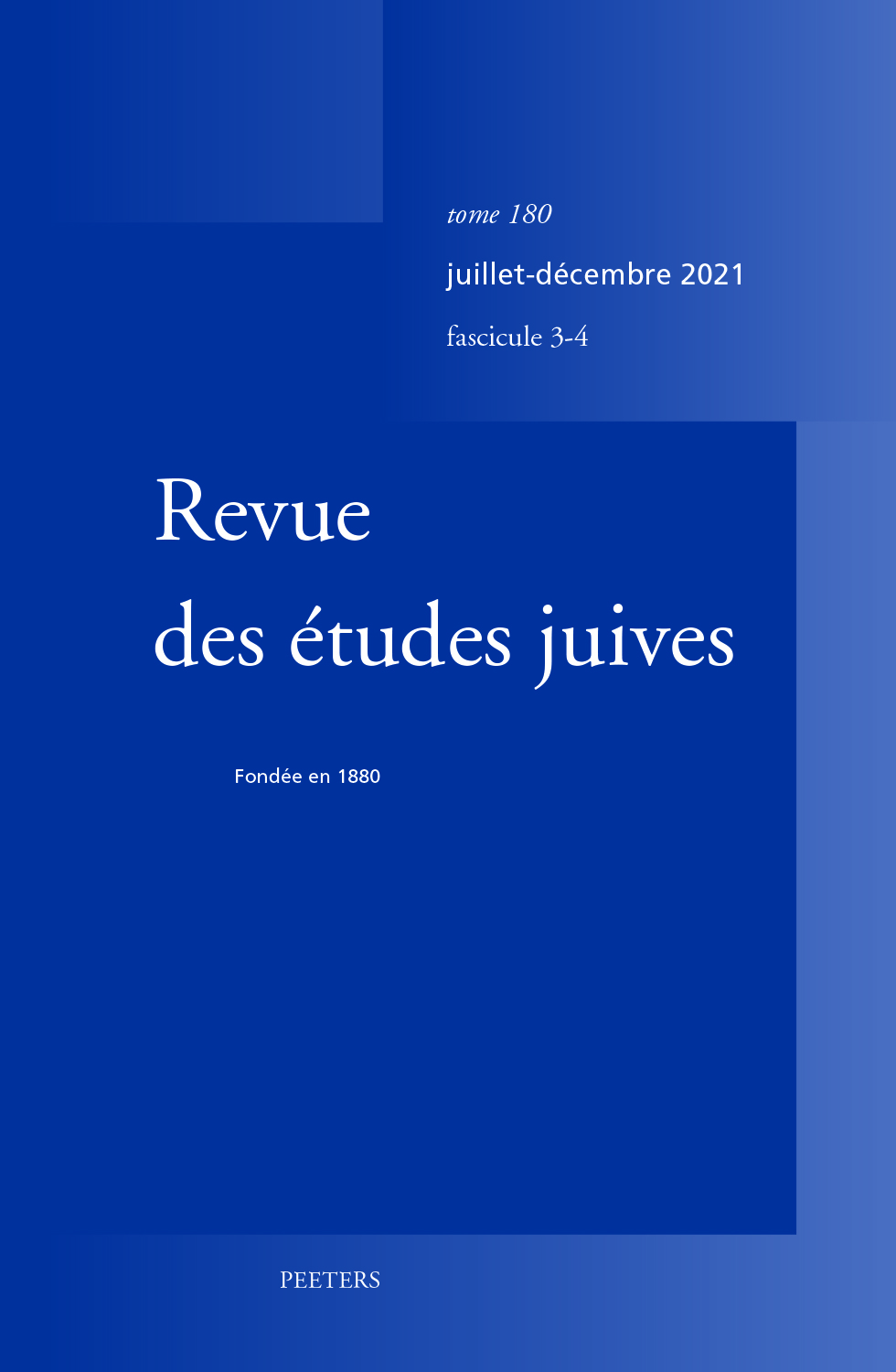 previous article in this issue previous article in this issue | next article in this issue  |

Preview first page |
Document Details : Title: The Theology of Jacob ben El'azar's Hebrew Version of Ibn al-Muqaffa's Kalīlah wa-dimnah Author(s): VERSKIN, Alan Journal: Revue des Études Juives Volume: 170 Issue: 3-4 Date: juillet-décembre 2011 Pages: 465-475 DOI: 10.2143/REJ.170.3.2141803 Abstract : Jacob ben El‘azar’s (d. 1233) Kalilah va-dimnah is a Hebrew version of the famous eighth-century Arabic work of advice for princes by ‘Abdallāh Ibn al-Muqaffa‘ (d. c. 756), who expressed a skeptical view of organized religion and celebrated the power of unaided human reason, a view clearly at odds with the teachings of the rabbis. It was one of the many Arabic non-Jewish texts which posed a dual set of problems for cultural mediators who wished to bring Arabic literature to a Jewish audience. (1) Translators from Arabic felt the need to create a Hebrew mode of expression which had the vitality and wit to do justice to the original and demonstrate the richness of the Hebrew language. To accomplish this, Ben El‘azar used creative rearrangements of biblical quotations in rhymed prose. While some of these quotations are used merely as a means of literary ornamentation, others are intertextual devices whose broader meaning must be determined with reference to their original biblical contexts. (2) Ben El‘azar also wished to judaicize the content of Ibn al-Muqaffa‘’s work. His work is in fact a reimagining of the original text. Ben El‘azar articulates a complex and subtle response to Ibn al-Muqaffa’s teachings, and, in so doing, offers his own particular, although recognizably rabbinic, approach to the nature of human evil, the problems of theodicy, and the nature of divinely ordained fate. He adapts and transforms Ibn al-Muqaffa‘’s Kalī lah wa-Dimnah from a text on political pragmatism to one of religious edification. Kalilah va-dimnah, de Jacob ben Éléazar (mort en 1233), est une version hébraïque du célèbre texte arabe de conseils pour les princes écrit par ‘Abdallāh Ibn al-Muqaffa‘ (mort vers 756), qui présente un point de vue sceptique envers la religion organisée et qui glorifie le pouvoir de la raison indépendante — position clairement opposée aux enseignements des rabbins. C’était un des nombreux textes arabes non-juifs qui posaient un problème à deux niveaux aux médiateurs culturels qui voulaient transmettre la littérature arabe aux lecteurs juifs. (1) Les traducteurs de l’arabe voulaient créer une expression hébraïque qui préserverait l’élan et l’esprit de l’original et montrerait la richesse de la langue hébraïque. Pour atteindre cet objectif, Ben Éléazar employait des réarrangements créatifs de citations bibliques en prose rimée. Quelques-unes des citations ne sont que de l’ornementation littéraire, mais il y en a d’autres qui sont des figures de style intertextuelles dont le sens doit être déterminé à partir de leurs contextes bibliques originaux. (2) Ben Éléazar espérait aussi judaïser le contenu de l’oeuvre d’Ibn al-Muqaffa‘. Son travail est en fait une réinterprétation du texte original. Ben Éléazar formule une réponse complexe et subtile, bien qu’évidemment rabbinique, aux enseignements d’Ibn al-Muqaffa‘, et il offre sa propre théorie de la nature du mal humain, des problèmes de la théodicée, et de la nature du sort décrété par Dieu. Il adapte et transforme la Kalīlah wa-dimnah d’Ibn al-Muqaffa‘, texte de pragmatisme politique, en un texte d’édification religieuse. |
|


